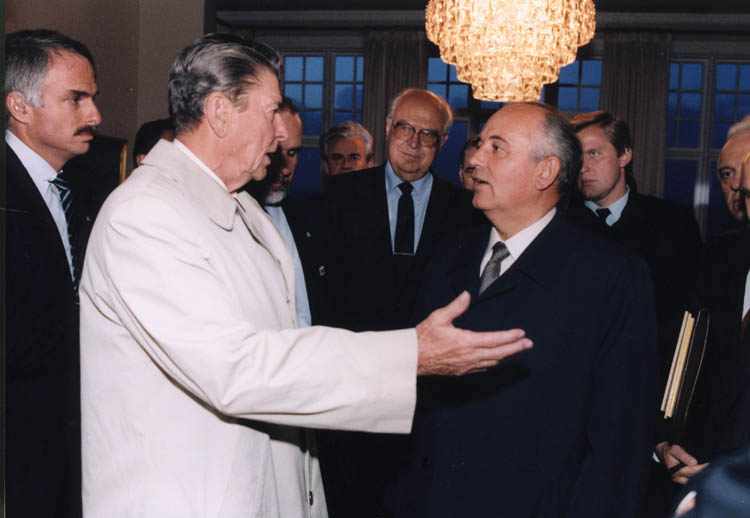Viewpoint by Jonathan Power*
MOSCOW (IDN-INPS) – Here I am in Moscow standing in front of a statue of Presidents Ronald Reagan and Mikhail Gorbachev to celebrate the unveiling of a statue crafted by the master sculptor, Alexander Bourganov.
I’m the only journalist invited to speak – and after I go with the others to drink Russian champagne. I talk to a group of students and a younger member of the Russian media contingent. I’ve also invited along a journalism student I met late at night on an almost empty street when I stopped to ask the way. She insisted on walking me to my hotel. To my surprise she accepted my offer of a drink and we spent an hour talking about her course and the Russian press. At the airport in the Aeroflot lounge I talked to one of the hostesses. It turned out she was a journalism graduate. On the plane I sat next to a Russian student studying in America.
In a quick three days in Moscow these chance meetings (although one TV producer is a friend) enabled me to get a snapshot of what some 30 year-olds and younger think about the government and the media.
Five out of nine were highly critical of President Vladimir Putin for one main thing: his overriding influence on the media. However, it is true that there remains one TV network and one radio network and a couple of newspapers which do not toe the line.
At the journalism degree course at the prestigious Moscow State University one tells me that many in her class are disillusioned by the media and wonder about the jobs available that are not in the hands of the government. .
Then it is my turn to tell them something. I remind them of what brought an end to the Cold War. Reagan, a rightist, who cut taxes for the rich and did little for the poor, was persuaded through his meetings with Gorbachev to nuclear disarmament. On one occasion both leaders sought to find a way to eliminate nuclear weapons altogether. Only misleading advice stopped them doing it. But they managed over the years to make some significant cuts in their nuclear armouries. Reagan said of the opponents to his nuclear deals with Gorbachev, “Some of the people who are objecting most, whether they realise it or not, those people basically down in their deepest thoughts have accepted that war is inevitable.”
For the first time since the just after communist revolution in 1917 the press and writers of all kinds were free to write and publish what they wanted.
My new contacts, like many other Russians, Europeans and Americans, forget what was achieved.
The end of the Cold War was in some ways “the end of history” – the end of nuclear threats. There was also large-scale military disarmament, the withdrawal of troops in Europe, more business and trade, more students going to the other side’s universities and scientific exchanges of all types.
To my mind the occasion when goodwill began its collapse was when President Bill Clinton decided to expand NATO eastwards. This policy was continued by George W. Bush and Barack Obama who expanded NATO right up to Russia’s borders. Gorbachev had made a deal with Secretary of State James Baker and German Chancellor Helmut Kohl that in return for allowing the two halves of Germany to reunite there would be no NATO expansion.
Overtime the American and European media became critical of Putin – every issue once treated soberly became a confrontation. At the time of Bush they began to demonize him, a process that continued under Obama, with him often giving the lead.
It all came to a head with Ukraine when Russian “volunteer” soldiers entered its eastern provinces. Later, official Russian soldiers invaded Crimea. This was triggered by EU negative negotiating tactics over a trade agreement. It led to protests by pro EU groups. However, they were infiltrated and subverted by fascist groups who turned the demonstrations towards violence, culminating in the fall of Ukraine’s government.
This week Putin and Donald Trump are going to have their first meeting. As president, Trump has not changed Obama’s policy except in one quite important respect – he has cut out the critical anti-Russian rhetoric. Before he became president he said how much he admired Putin. This he no longer says. He feels hemmed in by the accusations that his campaign was helped by Russia. This has given the anti-Putin foreign policy establishment time to organise pressure to keep his pro-Putin mind-set to himself – so far.
Can Trump negotiate with Putin and end the coming of a second Cold War? If Trump has success the achievements of Reagan and Gorbachev will be remembered anew, Putin would ease up on the Russian media and my young friends would have reason for hope. [IDN-INPS – 5 July 2017]
*Note: For 17 years Jonathan Power was a foreign affairs columnist for the International Herald Tribune. He has forwarded this and his previous Viewpoints for publication in IDN-INPS. Copyright: Jonathan Power.
Photo: President Reagan says goodbye to Soviet General Secretary Gorbachev after the last meeting at Hofdi House, Reykjavik, Iceland. White House Photo.
IDN is flagship agency of the International Press Syndicate.
facebook.com/IDN.GoingDeeper – twitter.com/InDepthNews

